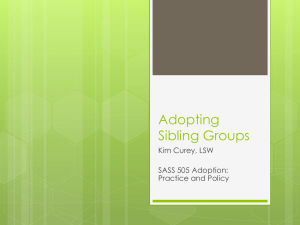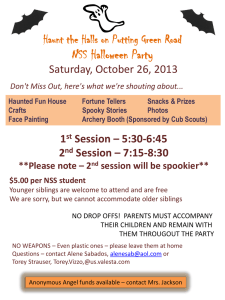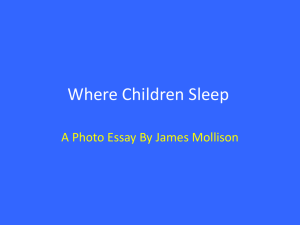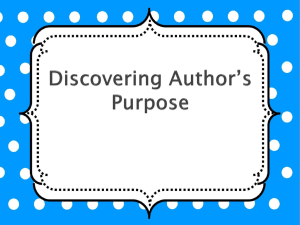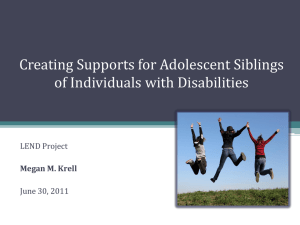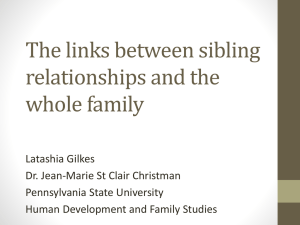Teen Siblings - A Survival Guide
advertisement
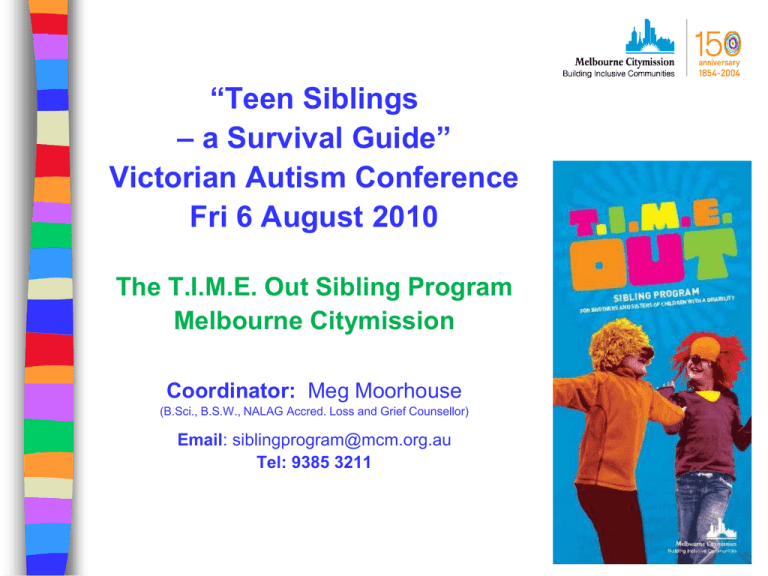
“Teen Siblings – a Survival Guide” Victorian Autism Conference Fri 6 August 2010 The T.I.M.E. Out Sibling Program Melbourne Citymission Coordinator: Meg Moorhouse (B.Sci., B.S.W., NALAG Accred. Loss and Grief Counsellor) Email: siblingprogram@mcm.org.au Tel: 9385 3211 “My Brother Strangled the Budgie” “Living in a family is one of the most difficult things we do. There are so many competing needs that must be met, and so little time to do so..” S.L. Harris & B. A. Glasberg, 2003, Siblings of Children with Autism, p122 What is the T.I.M.E. Out Sibling Program? T.I.M.E. Out stands for “This Is Me Everybody!”. A small program of Melb. Citymission, in its 6th year. Our philosophy is to support of the whole family when there is a child with a disability or special need. Running groups for 8 – 13 yos in Brunswick and Broadmeadows and a monthly teens group called ‘Give Me 5’ in Reservoir, currently with 70 siblings in regular contact. Providing parental support all over the northern and western region of metro. Melb. Assisting in education & awareness raising in the disability, health, youth, education sectors Siblings Are Becoming Acknowledged In Australia, there are over 200,000 young people aged 0-18 years with a severe or profound disability. Many more have a chronic illness (source: Siblings Australia website) For every child with a disability, there is at least 1 or 2 siblings No. of young carers: the Australian Bureau of Statistics (2003) tells us that there are approximately 347,700 young carers (5.2% of all people under 25) in Australia who provide support for a family member who has a disability, mental illness or other long term illness. An estimated 2 to 3 in every classroom. Why Siblings? “The sibling bond is a key component of the developing personality of children” “Siblings spend their childhood "sharpening their teeth" on each other “ “...with the sibling relationship playing such a central role in family life, we can't help but wonder how to maximize its gifts and minimize its burdens” Teresa Foden, 2009, Interactive Autism Network website Why support the siblings? Kate Strohm, Siblings Australia: Well, why NOT? Longest relationship Every individual in the family has a right for their needs to be met By supporting the sibling, nurturing the relationship between them and the child with special needs, the whole family functioning will be more positive. Everyone will cope better. Often these siblings are caregivers of the future – so the long term advantages are clear. “Siblings can gain inspiration, competence and independence leading to improved self esteem, and a range of human qualities that add not only to their own life but also those around them.” (Kate Strohm, Siblings, 2002) “Some of the best things/positives about having someone with a disability/special need in the family are…” (teen siblings and young carers, ‘Give Me 5’, April 2009) MAKING A DIFFERENCE HELPING UNDERSTANDING DISABILITY TEACHING THEM NEW THINGS HAVING A GREAT TIME WITH THEM HAVING GOOD TIMES & LAUGHS NOT DOING HOMEWORK BEING INDEPENDENT HAVING LOTS OF FUN, PLAYING AROUND THEY ARE INTERESTING GROWING UP WITH RESPECT FOR EVERYONE GOING BIKE RIDING WITH THEM ITS FUN TO HANG AROUND BEING ABLE TO HELP THEM AND HAVE LIFE LONG SKILLS Issues & Difficulties “I’m here too, mum” “Everything is about Richie. Richie, Richie, Richie”. Why overlooked? Difficult for sibling to express feelings – ‘survivor’ guilt Problems not recognized in the family – emotionally & physically stressed Problems not recognized by providers – ‘good child’ or ‘attention seeking’ Community lacks awareness No sibling policy in Australia “Some of the Challenges/Negatives about having someone with a disability/special need in the family are…” (teen siblings and young carers, ‘Give Me 5’, April 2009) The holes in the wall from the wheelchair Not having as much freedom because family comes first Not being able to have friends around a lot extra responsibilities no free time the jobs / duties (perceived unfairness) looking after family missing out on things you really enjoy early mornings Feeling sad for them, not having a ‘normal’ brother (grief/regret/longing) people staring at them not having anytime for myself, homework and stuff the lack of support and understanding from people people laughing and not understanding what they need So what is the key to some kids coping better? SUPPORT & ACKNOWLEDGEMENT Its important to remember that NOT ALL KIDS WILL EXPERIENCE DIFFICULTIES. Autism & Siblings – What’s Unique? Autism is difficult to understand “… autism is associated with more abstract symptoms than most other illnesses and disorders…” S.L. Harris & B. A. Glasberg, 2003, Siblings of Children with Autism …..parents can overestimate children’s understanding of autism. The sibling relationship is particularly challenged “....attempts to play with his/her brother are probably rebuffed by his ignoring her, fall flat because of his lack of play skills, or end abruptly because his tantrums are frightening. How many of us would keep trying to form a friendship with someone who turned her back when we spoke to her, or, even worse, seemed angry when we approached?" Teresa Foden, 2009, Interactive Autism Network website Co-related symptoms for the sibling “…nagging concerns that typically developing siblings in families with autism may be more vulnerable to behavioural problems, speech and language disabilities, anxiety, and depression and other mood disorders. The genetic component of autism also must be considered...” Teresa Foden, 2009, Interactive Autism Network website “Autism is catching in my family.. we’re all on the scale!” TIME Out Sibling parent Its emotionally challenging .. Piaget stated that emotionally sensitive topics are sometimes more difficult to process cognitively than other topics.. Autism’s trajectory isn’t smooth & can have components of physical aggression When to be concerned….. Some of the common concerns parents and I pick up on are: Withdrawal from family/or friends Acting out – aggressive, back chatting etc Being too good, perfectionism, over-achieving, compensating Anxiety, depression, low esteem, not wanting to try new things Drop in school performance Physical issues: constant headaches, illness, tiredness, no appetite, stomachaches, sleeplessness Things that may effect their experience are complex: Sibling birth order Characteristics of the sibling themselves Sibling’s perception – what meaning are they making of a situation? Sibling’s sense of competence and resilience, self esteem Interaction of other sibling – sibling relationship Reactions of peers, other supports external to family etc etc Focus on Teenager Siblings 1. Intellectual capacity vs emotional capacity “…factual understanding and emotional acceptance are different processes and feelings can interfere with gaining and using knowledge…” p68, S.L. Harris & B. A. Glasberg, 2003, Siblings of Children with Autism 2. Privacy & Peers.... “At the age of wanting to fit in, she tries to defend him the best she can without causing drama among her friends. Drama is a daily occurrence among twelve year old girls. Despite these feelings, I see what autism has given my daughter: patience, acceptance of differences in others, loyalty towards her brother when friends make mean comments, compassion and kindness towards other people…” Remy Nirschl, 2006, “Collateral Damage?”, from www.ageofautsim.com 3. Increasing caregiving role.. balance the burdens Value their contributions, but have limits! Keep the roles clearly delineated, eg. Checking in at school is fine but not constant monitoring… “This is mum’s job…” “Except under very unusual conditions, parents, not siblings, are responsible for disciplining children… if necessary though.. they need to have the authority to manage their sibling… the challenge is to find age-appropriate ways for children to make these contributions..” p20, S.L. Harris & B. A. Glasberg, 2003, Siblings of Children with Autism 4. Own Questions About the Future What will be my responsibility as an adult for my sibling… ? What are the chances of own children having autism themselves.. ? - Personal concerns may be difficult to express.. they not want to upset you, are perhaps ashamed or embarrassed by the thoughts.. often they reveal more to their friends 5. Striving for Independence Teens can comprehend more about complex issues like their parent’s struggles, but this can conversely make the process of separation from the family more difficult. Protective of parents… overly responsible for family’s wellbeing. The sibling experience can “..diminish a child’s feeling of being a unique and special person, entitled to lead a separate life. Some children may overly identify with their sibling and feel responsible for his welfare… In order to establish healthy adult relationships, we need to experience the legitimacy of our own needs as well as other’s needs..” p 17, S.L. Harris & B. A. Glasberg, 2003, Siblings of Children with Autism 6. Consider their Adulthood Adult siblings of tomorrow will have had very different childhood experiences than the current adult siblings of people living with autism – a positive Parents cannot claim sole responsibility for the quality of their children’s adult relationships.. Acquaint your teenager with the skills of advocacy “You may not be physically present in your child’s life when he achieves that level of understanding about autism and about his relationship with his brother and with you, but the gifts of love, support, and wisdom you shared with him across the years of his childhood will endure and form the matrix of his mature understanding..” p73 S.L. Harris & B. A. Glasberg, 2003, Siblings of Children with Autism A Focus on You, the Parent Parents need: Support for the ‘other’ ‘normal’ children. A catch up in how to parent adolescents ! “I care and worry just as much for my other kids, but just don’t have the time or energy.” Someone to prioritise the other sibling – “Often you are the only professional who when they ring, asks about Michael, first..” Education, linkages, referrals, advocacy Understanding from extended family and friends – for both emotional and practical support – mentoring for adolescent, respite for parent/sibling/child with disability “…grandparents tended to underestimate the seriousness of the impact of a child’s autism on the family “ Harris, Handelman, & Palmer, 1985 HINTS & STRATEGIES based on: “What Siblings Would Like Parents & Service Providers to Know” 1. The Right to One's Own Life - “I’m here too mum” 2. Acknowledging Siblings' Concerns – “I’m sick of having to stick up for him” 3. Expectations for Typically-Developing Siblings – “Don’t worry about it, I’ll get my own dinner” 4. Expect Typical Behaviour from Typically-Developing Siblings – “I hate him” . 5. Expectations for the Family Member with Special Needs – “Why does she get away with it?” 6. The Right to a Safe Environment – “I’m scared he’ll hit me” 7. Opportunities to Meet Peers – “Really? Me too!” “He came home from the group and said ‘We thought we had it bad, you’ll never guess what Tristan has to do at home.’ He’s actually playing with his brother now, like normal kids.” “Its hard to put it into words but there’s been at attitude shift” 8. Opportunities to Obtain Information – “When is it going to get better?” 9. Sibs' Concerns about the Future – “What about my kids?” 10. Including Both Sons and Daughters – “Boy’s don’t do that” 11. Communication – “Grunt. Nah. Yup. Gotta go” 12. One-on-One Time with Parents – “Pick me up early Dad” 13. Celebrate Every Child's Achievements and Milestones – “Why can’t you be there?” 14. Parents' Perspective is More Important than the Actual Disability – “What do you reckon?” And messages for the service sector: As one sister wrote: " Anyone interested in the welfare of people with disabilities ought to be interested in us.” 15. Include Siblings in the Definition of "Family". 16. Actively Reach Out to Brothers and Sisters. 17. Learn More About Life as a Sibling. 18. Create Local Programs Specifically for Brothers ad Sisters. 19. Include Brothers and Sisters on Advisory Boards and in Policies Regarding Families. 20. Fund Services for Brothers and Sisters. Extended Networks for the Sibling are Vital Its not all up to the parent, in fact you may not be the best person to assist! Layers are important (Andrew Fuller, Melb. Adol. Psychologist) All of these networks need to be informed and responsive…. •Other siblings •Community •School •Peers •Extended family/friends Autism can be invisible, the siblings’ needs can also be invisible “She’s never talked about it at school, now the teachers know and she’s going in early to get extra help. The Most Important Things a Parent Can Offer the Sibling is : 1. Information & skills 2. Active Listening 3. Permission to express their feelings and needs - keep in mind that you want your child to feel comfortable speaking with you again 4. To feel special - walk in their shoes! Many reactions and comments can mean I want special attention and to feel important too… “What matters is that the overall atmosphere in your family is one in which people are all working to understand one another’s experiences and to solve problems jointly. Children can be very forgiving of mistakes when they know their parents are trying hard to do the right thing… “ p100, S.L. Harris & B. A. Glasberg, 2003, Siblings of Children with Autism Thank you. Enjoy “Is Everything OK At the OK Corral?” A short film made by teen sibs and young carers
